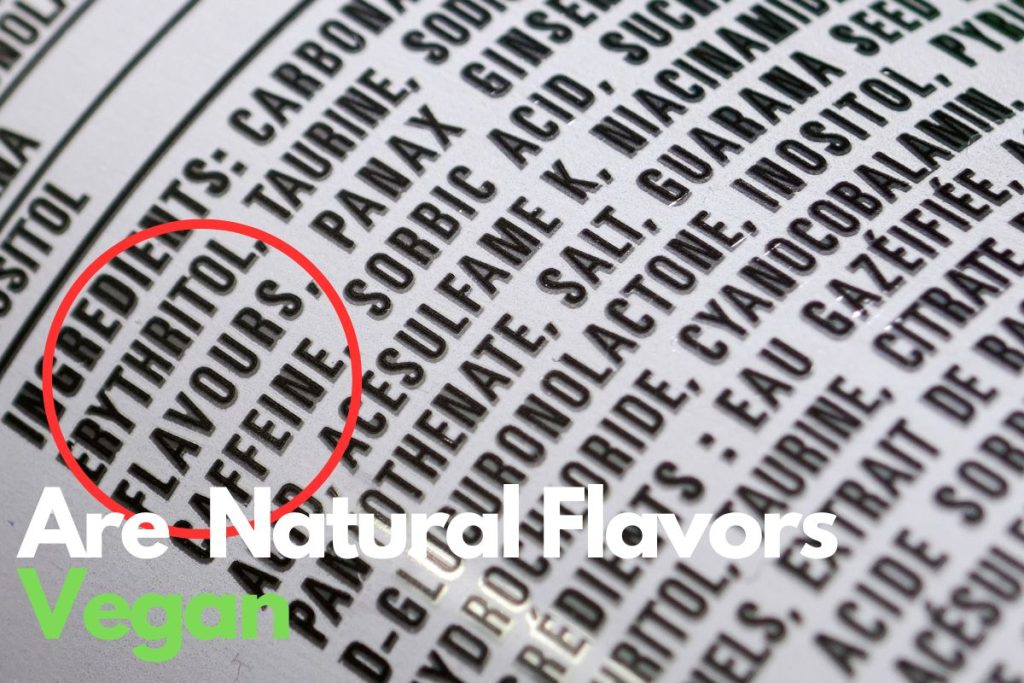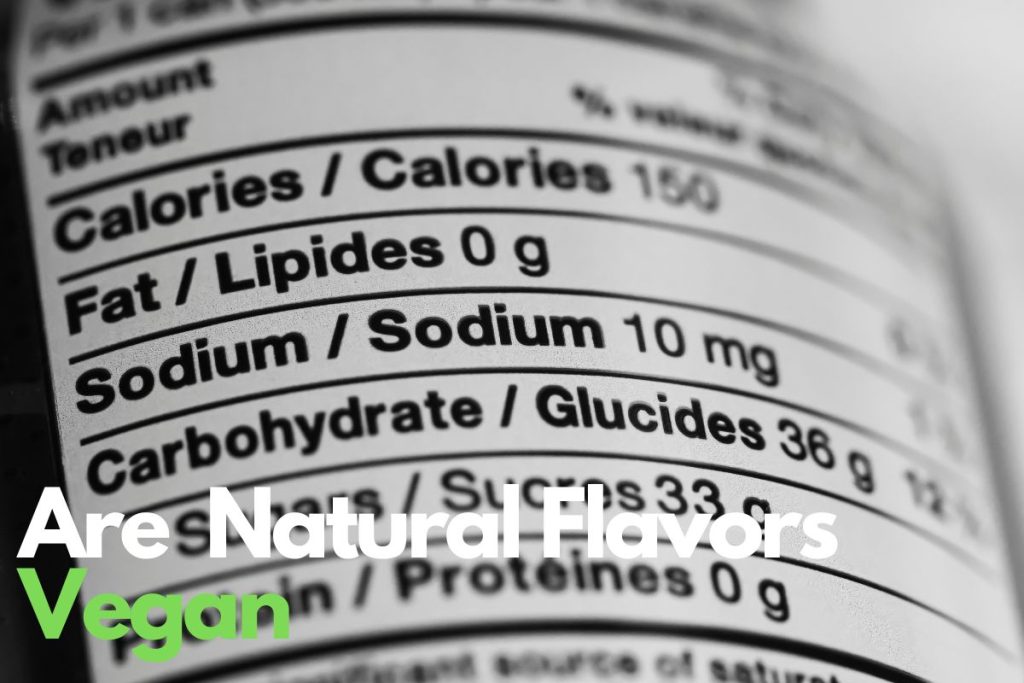When going vegan, understanding the ingredients in our food is paramount. One term that frequently pops up on ingredient lists is “natural flavors.”
The term “natural flavors” can be somewhat elusive, often leaving consumers puzzled about what they’re actually consuming.
This is especially true for vegans, who need to ensure that their food doesn’t contain any animal-derived ingredients.
But what exactly does this term mean? More importantly, are natural flavors vegan?
In this article, we are going to explore the term “natural flavors,” dive into whether they are vegan, and provide tips on how to identify vegan-friendly natural flavors.
Before we can answer the question, “Are natural flavors vegan?” we first need to understand what “natural flavors” are.
What Are Natural Flavors?

The term “natural flavors” is defined by the US, Food and Drug Administration (FDA) as substances derived from plant or animal sources, including meat, poultry, seafood, eggs, dairy products, herbs, spices, fruits, vegetables, and other foods.
These flavors are used to enhance the taste of food and drink products.
Natural flavors can be found in a wide variety of products, from processed foods and drinks to personal care products.
They are used to add or enhance the flavor of these products, making them more appealing to consumers.
Despite their name, natural flavors are often highly processed and can be made up of many different components.
In fact, a single natural flavor can contain anywhere from 50 to 100 ingredients, including preservatives, solvents, and other additives.
In the next section, we are going to answer our main question, on whether these natural flavors are suitable for a vegan lifestyle.
Are Natural Flavors Vegan?
Determining whether natural flavors are vegan can be a tricky task.
As we’ve learned, the term “natural flavors” is a broad one that can include substances derived from both plant and animal sources.
This means that not all natural flavors are vegan.
The challenge for vegans is that food labels typically don't specify the source of the natural flavors.
They simply list “natural flavors” as an ingredient, without any indication of whether those flavors come from plant or animal sources.
This lack of transparency can make it difficult for vegans to determine whether a product with natural flavors is suitable for their diet.
Furthermore, even if a natural flavor is derived from a plant source, it may still be processed with non-vegan substances.
For example, certain methods of extracting flavors from plant materials may use animal-derived solvents or carriers.
So, while it's possible for natural flavors to be vegan, it's not a guarantee.
Without specific information from the manufacturer, it’s impossible to know for sure.
In the next section, we’ll discuss some potential non-vegan sources of natural flavors to be aware of.
Potential Non-Vegan Sources of Natural Flavors
While many natural flavors are derived from plant sources, there are also several that come from animal sources.
Here are a few examples of natural flavors that are not vegan:
1-Castoreum
Castoreum is a substance derived from the castor sacs of beavers.
It’s used as a natural flavoring in some food and beverage products, particularly those with a vanilla, raspberry, or strawberry flavor.
While it’s not commonly used due to its high cost and the difficulty of obtaining it, it’s still a potential non-vegan source of natural flavors.
1-Shellac
Shellac is a resin secreted by the female lac bug.
It’s used as a natural flavoring and glazing agent in some food products, particularly candies and pills.
While it’s not directly harmful to the bugs, the process of harvesting it often results in their death, making it non-vegan.
3-Cochineal
Cochineal, also known as carmine or E120, is a red dye made from the crushed bodies of cochineal insects.
It’s used as a natural flavoring and coloring in a variety of food and drink products.
These are just a few examples of the potential non-vegan sources of natural flavors.
Without specific information from the manufacturer, it’s impossible to know whether a product with natural flavors contains these or other animal-derived ingredients.
In the next section, we’ll discuss some vegan-friendly natural flavors.
Vegan-Friendly Natural Flavors
While some natural flavors are derived from animal sources, many are plant-based and suitable for vegans. Here are a few examples:
1-Vanillin
Vanillin is a flavor compound that’s derived from the vanilla bean.
It’s the primary component of the extract of the vanilla bean and is responsible for the characteristic flavor and smell of vanilla.
While vanillin can be synthesized from various sources, including some that are not vegan, the vanillin derived directly from the vanilla bean is plant-based and vegan-friendly.
2-Limonene
Limonene is a flavor compound that’s derived from citrus fruits like lemons and oranges.
It’s responsible for the characteristic citrusy smell and flavor of these fruits.
Limonene is plant-based and vegan-friendly.
3-Menthol
Menthol is a flavor compound that’s derived from mint plants.
It’s responsible for the characteristic cooling sensation and minty flavor of these plants.
Menthol is plant-based and vegan-friendly.
These are just a few examples of the many plant-based natural flavors that are suitable for vegans.
However, as we’ve discussed, the term “natural flavors” on a food label doesn’t specify the source of the flavors, so it’s not always possible to know whether they’re vegan just by reading the label.
In the next section, we’ll provide some tips on how to determine if natural flavors are vegan.
How to Determine if Natural Flavors are Vegan?
Given the ambiguity of the term “natural flavors,” how can vegans determine if a product with natural flavors is suitable for their diet?
Here are a few tips:
1-Look for Vegan Labeling

The simplest way to determine if a product is vegan is to look for vegan labeling.
Many food products today are labeled as “vegan,” “suitable for vegans,” or “certified vegan.”
These labels indicate that the product does not contain any animal-derived ingredients, including natural flavors.
2-Contact the Manufacturer
If a product isn’t labeled as vegan but contains natural flavors, you can contact the manufacturer to ask about the source of the natural flavors.
Many companies are happy to provide this information to consumers.
3-Use a Vegan App
There are several apps available that can help you determine if a product is vegan.
These apps allow you to scan the barcode of a product and provide information about whether it’s vegan-friendly.
4-Choose Products with Specific Flavoring
Instead of choosing products with “natural flavors,” you can opt for products that specify the source of their flavors.
For example, instead of “natural flavors,” a product might list “vanilla extract” or “lemon oil” as an ingredient.
Remember, the goal of a vegan lifestyle is to reduce harm to animals as much as possible.
While it may not always be possible to determine the source of every ingredient, making informed choices based on the information available to you is a step in the right direction.
Are Artificial Flavors Vegan?
When it comes to artificial flavors, the question of whether they are vegan or not can be a bit complex.
Artificial flavors are chemically synthesized, often from petroleum derivatives, and are not typically derived from animal sources. This would suggest that they are suitable for a vegan diet.
However, it’s important to note that while the flavors themselves may not contain animal products, the process of developing these flavors can sometimes involve animal testing.
This is because new food additives, including artificial flavors, must be tested for safety before they can be approved for use in food products.
These safety tests can sometimes involve the use of animal models, which is a practice that many vegans object to on ethical grounds.
Furthermore, while the artificial flavors themselves are typically vegan, they are often just one component of a food product that may contain other non-vegan ingredients.
For example, a candy might be flavored with vegan artificial flavors but colored with a dye made from an animal product.
So, while artificial flavors themselves are typically vegan, whether a product containing artificial flavors is vegan will depend on other factors, including the presence of other ingredients and the use of animal testing.
Final Thoughts:
It’s impossible to know for sure whether the natural flavors in a product are vegan.
While it might seem like a simple, wholesome term, the reality is that natural flavors can come from both plant and animal sources, making it a potential minefield for vegans.
However, by looking for vegan labeling, contacting manufacturers, using vegan apps, and choosing products with specific flavorings, you can make more informed choices.
Remember, being vegan isn’t about being perfect. It’s about doing the best we can to reduce harm to animals.
So, while the ambiguity of terms like “natural flavors” can be frustrating, don’t let it discourage you.
Every step we take towards a more compassionate lifestyle, no matter how small, makes a difference.
